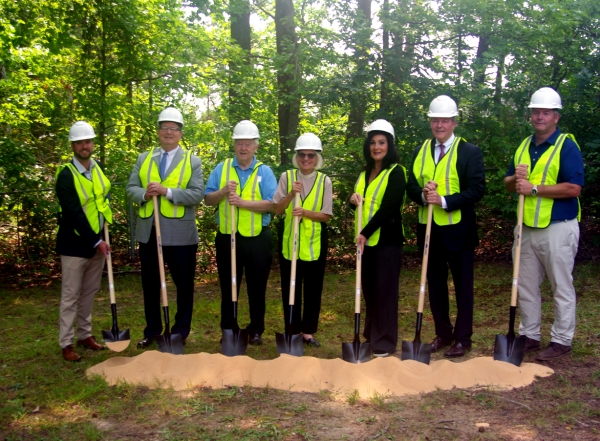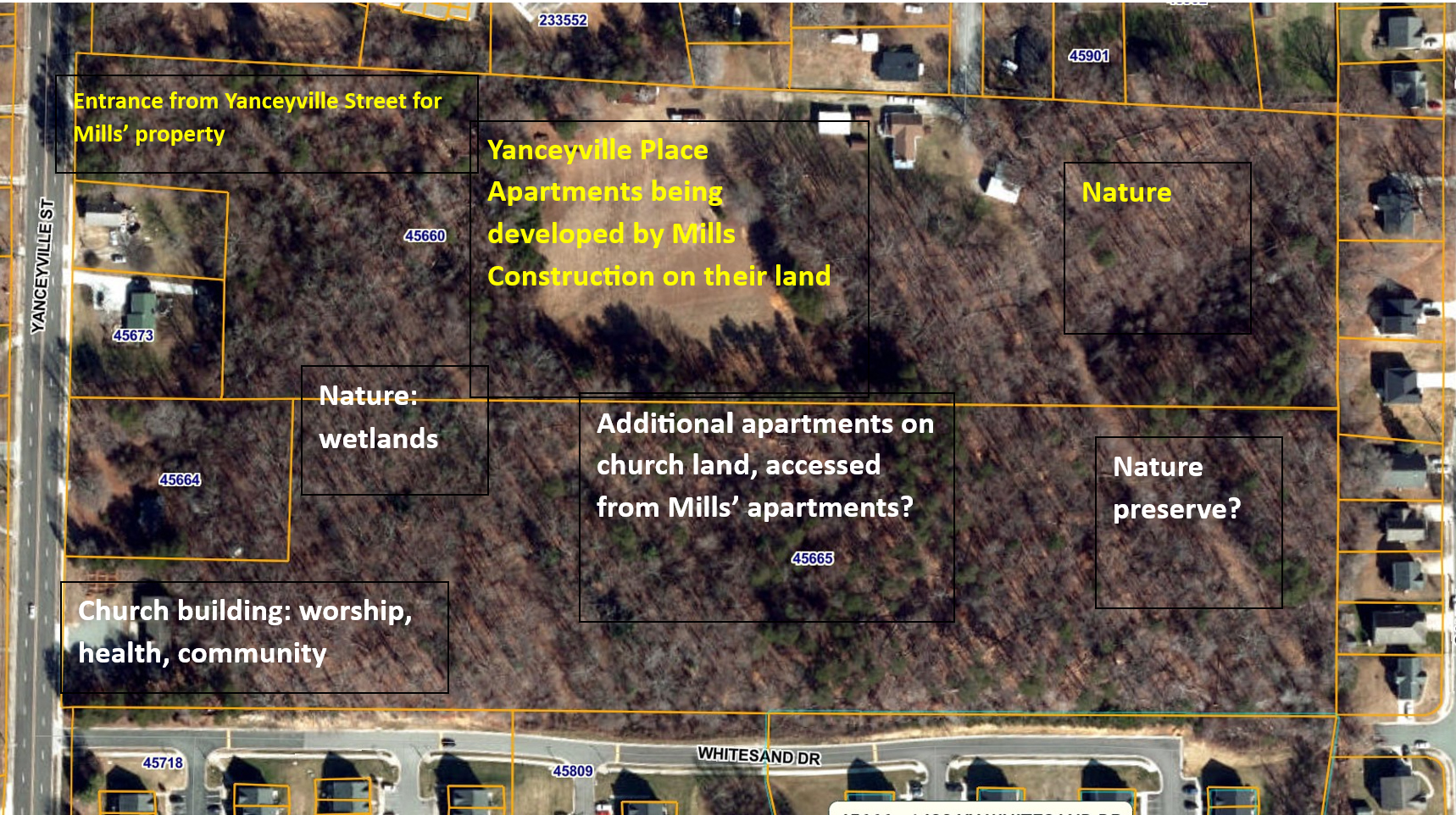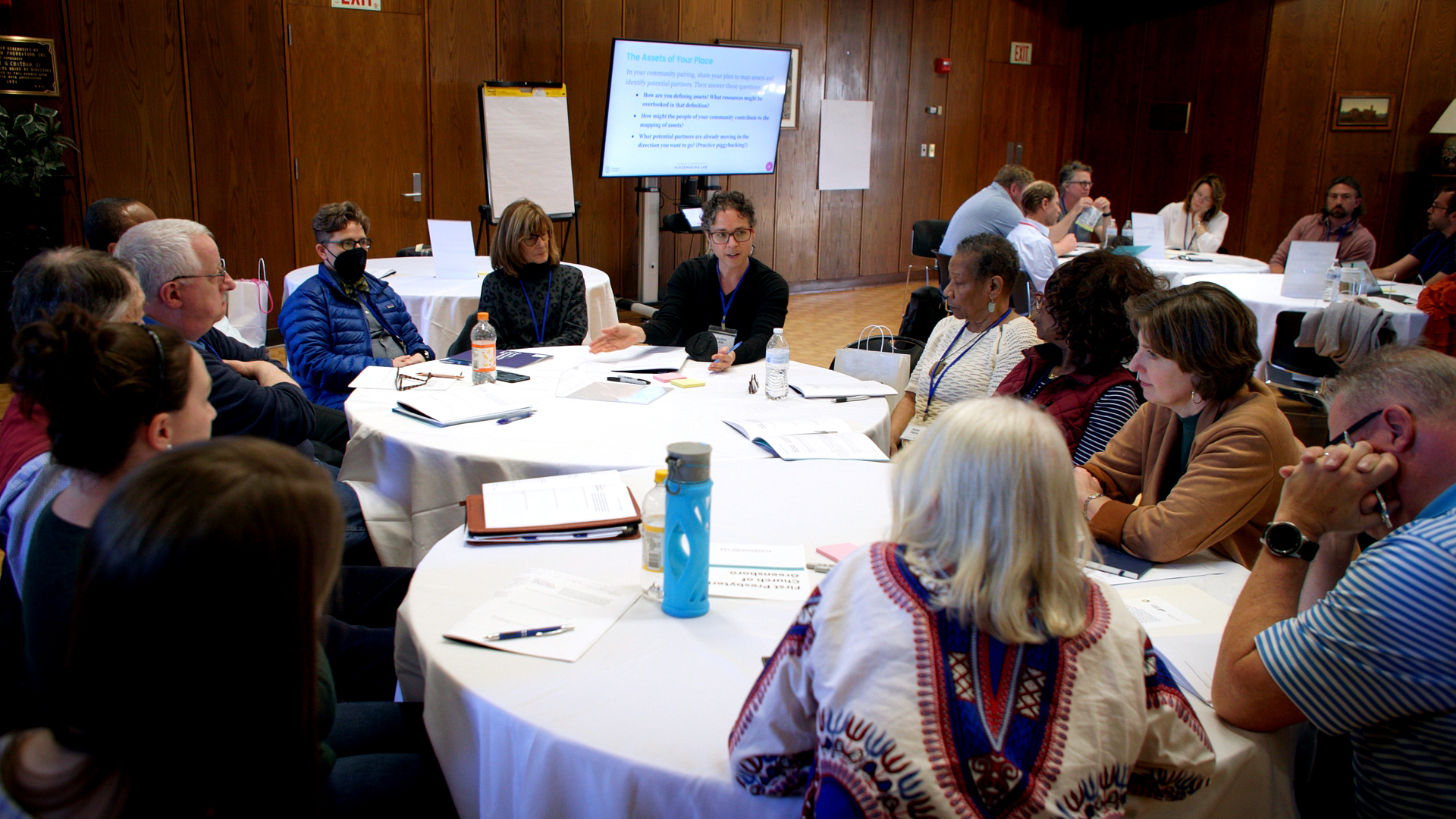Disciple: Building a Partnership

Holy Spirit, Greensboro, discerns how to serve its community
By Summerlee Walter
There is a tragic irony to the modern housing market: As community prosperity increases, so does homelessness. While homeowners benefit from increased property values and landlords increase their profits in a hot housing market, more and more people are priced out of the rental market. According to a June 28, 2022, news report from the local Greensboro Fox affiliate, rents in that city had increased by more than 40% since the start of the COVID-19 pandemic in March 2020, and they have only continued to rise, albeit at a much slower rate. For people already struggling to afford housing, however, the pandemic-era increase—one of the largest in the country among big cities—remains a devastating reality.
One way to balance the inequity is for municipalities to make a concentrated effort to preserve and build affordable housing. There are barriers, however. Building affordable housing is nearly as expensive as building market-rate housing, and the land on which to build has to come from somewhere. Affordable housing developments often face the additional challenge of neighborhood pushback.
For the congregation of Holy Spirit, Greensboro, however, a planned affordable housing complex on the property adjacent to the church was a welcome development. After learning about the plan in early 2020, the Rev Audra Abt, vicar of Holy Spirit, and the Rev. Beth McKee-Huger, northwest regional deacon and affordable housing advocate, approached the developer in a spirit of welcome—not with the opposition new housing developments often face from established residents. The builder turned out to be Fred Mills of Mills Construction Company, who has been dedicated to building affordable housing for 55 years.
“This was a God thing for the developer to turn out to be someone like that compared to some of the stereotypes people have of developers,” McKee-Huger said.
The ensuing partnership is on track both to provide much-needed resources to the neighborhood and to help Holy Spirit achieve a long-term goal to redevelop the church’s unused property into something missional.
[Image: The June 8 groundbreaking on the affordable housing complex was an important step in the ongoing discernment around the use of unused property at Holy Spirit, Greensboro. Pictured are Dan Duda, Churchill Stateside Group; Chris Clemmons, First Bank; Fred Mills Sr., FGM Development, LLC; the Rev. Beth McKee-Huger; Nancy Vaughan, mayor of Greensboro; Marc Isaacson, NC Housing Finance Agency Board of Directors; and Fred Mills Jr., Mills Construction Company of SC, LLC. Photo by Edwin Powell]
A LONG DISCERNMENT
While reaching out to Mills was a spur-of-the moment decision, just to see what might happen, Holy Spirit’s interest in affordable housing is anything but. For more than 30 years, the congregation of Holy Spirit has been talking about building affordable housing on a portion of the property behind the church building. The biggest challenge has been a lack of street access on the part of the property suitable for building. The nature of the property itself also provides a challenge. A stream crosses the 11 acres, much of which is heavily wooded, and Holy Spirit is committed to preserving the land’s natural beauty. Part of the discernment process has been deciding how to balance a commitment to affordable housing with a commitment to creation care.
The Mills development project solves the first problem, since the developer will build street entrances and a parking lot to access the apartment complex. It might also provide insight into the second, since Mills has invited Holy Spirit to partner by facilitating community relationships and providing direct services through the complex. At Holy Spirit’s suggestion, Mills has agreed to build private rooms dedicated to a nurse and a social worker in the building’s community center—Mills properties always include such a gathering space—and Holy Spirit will facilitate the services through its pre-existing partnerships and sister mission Abundant Life, a health and healing ministry started out of the church.
The Mills-Holy Spirit partnership has been beneficial for everyone involved because it is built on mutual respect for each party’s expertise. “We have not had a cross word,” Mills explained. “I respect their strong suits, and they respect mine. The neighborhood, I listen to them; driving the nails, they listen to me.”
The hard work of developing a building project and cultivating community engagement—made harder by the COVID-19 pandemic—reached a celebratory milestone on June 8, when Mills Construction Company and Holy Spirit officially broke ground on the apartment complex. As Mills turns to construction, Holy Spirit continues its discernment about the use of its own resources.
“The groundbreaking for this broad-based collaboration marks an important next step in a dream that has been 30 years in the making,” Bishop Sam Rodman, bishop of the Diocese of North Carolina, said. “It is a part of God’s dream for this community, the people of this neighborhood, and the congregation of the Holy Spirit and their partners at Abundant Life. Their passionate commitment to providing well-built affordable housing for their neighbors is an embodiment of Jesus’ invitation to love our neighbors and an inspiration to other congregations who are being called to engage in similar efforts in their community.”

[Image: Land usage discernment diagram. Courtesy of Holy Spirit]
FINDING THE RIGHT PARTNERS
In the midst of building a new partnership with Mills Construction Company and navigating ways to provide resources to the neighborhood in the midst of a pandemic, Holy Spirit also joined the pilot class of the Church & Community Placemaking Lab out of the Ormond Center at Duke University. (The six-church cohort also includes All Saints’, Warrenton.) The lab’s mission is “to foster renewed imagination, will, and ability among clergy, congregations, and communities as we journey together, becoming agents of thriving.” Founded on the idea that “every neighborhood possesses one significant asset: underutilized church property,” the lab is designed to prepare community teams to engage with developers and other partners and to provide them with access to resources relating to discernment practices, site analysis, feasibility methodologies and community engagement. Part of the pilot program is learning whether or not this type of discernment process can be condensed into a six-month process with the proper support and resources.
Holy Spirit has been exploring several ideas for its property, seeking to balance its resources—11 acres of wooded land, deep community partnerships and a close relationship with Abundant Life’s thriving health and healing ministry—with multiple priorities. Ideas they’ve considered include affordable housing, increased health access services, an ecological education and conservation center, and space for incubating businesses owned by women and historically marginalized groups. The conversations have included several community partners, including the Greensboro Parks and Recreation Department, which works with Abundant Life to host programs from children and teenagers in the recreation center across the street from the church; the Cone Health’s Congregational & Community Nurse Program, which supplies the nurse who provides health care each Tuesday evening at Abundant Life; UNC-Greensboro Department of Public Health Education, which provides student interns each spring; Mills Construction Company; Greensboro Urban Ministry; and the Community Foundation of Greater Greensboro, which provided a grant that allowed Holy Spirit to participate in the lab. The Diocese of North Carolina has also provided support throughout the process, with Chief Financial Officer Maria Gillespie providing answers and advice, and Bishop Sam Rodman and Bishop Jennifer Brooke-Davidson voicing support. (As a mission church, Holy Spirit’s property is owned by the diocese.)

At the time of the church’s acceptance into the program in the spring of 2022, Abt said, “As we pray and imagine new ways to contribute to God’s Kingdom in partnership with our neighbors, we’re keeping in mind things Jesus taught about how God makes space for all: the mustard seed which grows so great that all the birds of the air come and lodge in its branches (Matt. 13:31-32), and in John 14:2, Jesus declares ‘In my Abba Father’s house there are many homes… and I am going to prepare a place for you.’ Making a place for more affordable housing, ecosystem conservation, and thriving, locally owned businesses benefits our whole community, and we see it as our contribution to God’s work. Even more, as a church in the midst of all this activity, we see God inviting us to become a community of people opening ever more fully to God, each other and all our kindred in creation to love, care and serve each other in mutual recognition of Christ in one another.”
[Image: Members of the Holy Spirit discernment team participated in the March 4 opening meeting of the Church & Community Placemaking Lab. Photo courtesy of The Ormond Center at Duke Divinity School]
The Church & Community Placemaking Lab formally began on March 4 with an opening gathering so the churches could meet each other. Since then, Holy Spirit’s core discernment team has consulted with experts in entrepreneurship and real estate, and they travelled to Washington, D.C., May 18-19 to learn from other churches that have repurposed their land. Bob Powell, a Greensboro-based affordable housing advocate and former professor of architecture at North Carolina A&T State University, volunteered to lead the structured discernment process, which included individual conversations with potential partners, community members and church members, plus a large stakeholders’ gathering. Currently, the team is creating a list of big dreams, which will be whittled down into a manageable, actionable plan at the end of the process. The team will present to the rest of the cohort during the lab’s capstone gathering on September 16.
THE CALL
Regardless of the final outcome, Holy Spirit is dedicated to making the best use of its land for the community.
“Of course there’s lots of times that Jesus tells us where our priorities ought to be and that, ‘Blessed are the poor,’ and he even throws in there, ‘and woe to you who are rich’—most people don’t want to remember that Luke version of the beatitudes,” McKee-Huger said. “And he’s very explicit in Matthew 25, where were you when I needed something, and you weren’t doing anything, and they go, oh no, we didn’t know it was you, Jesus says, well, you knew it was somebody, and that somebody is my brother or sister.
“This is what God calls us to do.”
THE BISHOP'S COMMITTEE ON AFFORDABLE HOUSING
Summerlee Walter is the communications coordinator for the Diocese of North Carolina.
Tags: North Carolina Disciple / Affordable Housing / Collaboration & New Communities
